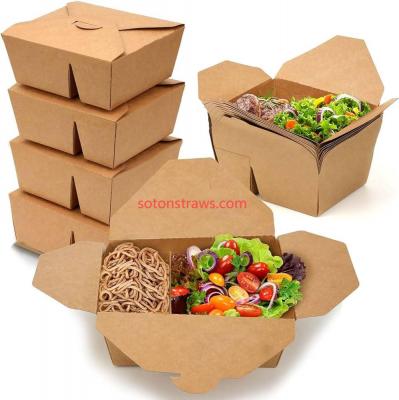Categories
Tags
-
#Eco-friendly disposable gloves
#Biodegradable protective gloves
#Sustainable hand protection
#PP Straws
#recyclable plastic straws
#food-safe drinking straws
#sustainable packaging
#biodegradable cups
#eco-friendly solutions
#PP Straw Manufacturers
#Durable Drinking Straws
#Food-Grade PP SotonStraws
#disposable kraft box
#Soton Box
#Food-Grade Safety
#PP Straw
#SotonStraws
#straws Factory
#eco-friendly straws Factory
#OEM disposable kraft box
#straws factory Manufacturer
#disposable kraft box Factory
#Paper Straws Manufactory
#Kraft Take Out Box Manufacturers
#Disposable Paper Cups
#soton
Archives
Building Durability: Soton Integrates Bagasse into Disposable
-
The demand for truly sustainable food packaging has accelerated, moving beyond mere plastic replacement to solutions rooted in circular resource use. Integrating agricultural residues like wheat straw and sugarcane bagasse into fiber production presents a compelling avenue. For a disposable kraft box designed to hold meals securely, the inherent strength and unique properties of these fibers become invaluable. These materials, traditionally viewed as low-value farm waste requiring disposal, offer significant structural benefits while reducing pressure on virgin wood pulp sources. This shift represents more than material substitution; it signifies a systemic transformation where farming byproducts become essential ingredients for durable, eco-conscious packaging.
Sourcing these residues effectively is foundational. Wheat straw, abundant after grain harvests, possesses long, resilient fibers ideal for imparting rigidity. Sugarcane bagasse, the fibrous stalk residue remaining after juice extraction, is plentiful in tropical regions and contributes bulk and natural binding properties. Blending these materials creates a composite fiber with enhanced characteristics – the straw provides backbone, the bagasse fills and binds – often surpassing the performance of pure wood pulp for certain packaging applications, particularly where grease resistance or compression strength is vital. Transforming this concept into reliable industrial-scale production, however, requires overcoming logistical complexities. Establishing efficient collection networks to gather sufficient volumes of these bulky, geographically dispersed materials is paramount. Processing facilities must be strategically located near agricultural zones to minimize transport emissions and costs, forming localized bio-economies where farm waste is valorized into high-demand packaging materials.The processing journey itself demands specialized technology. Agricultural residues differ significantly from wood chips in composition and behavior. They often contain higher levels of silica (especially rice husks, though not the focus here) or natural waxes and require tailored cleaning, pulping, and refining techniques. Gentle pulping methods preserve the valuable long fibers crucial for strength, while precise refining optimizes the blend for formation and drainage on the paper machine. Success hinges on adapting conventional kraft or semi-chemical pulping processes to handle these alternative feedstocks effectively without compromising yield or creating undesirable residues. The resulting pulp must meet stringent quality standards for food contact, demanding rigorous removal of potential contaminants. Achieving a consistent, high-quality furnish from variable agricultural inputs is a significant engineering feat, transforming disparate waste streams into a uniform raw material suitable for demanding disposable kraft box production.Beyond the technical aspects, this integration offers profound environmental advantages. Diverting wheat straw and bagasse from open-field burning – a common disposal practice contributing to severe air pollution in many regions – mitigates significant carbon emissions and particulate matter release. Utilizing these residues reduces the demand for virgin wood pulp, thereby conserving forests and biodiversity. The production lifecycle, when managed responsibly, often shows a lower water footprint compared to traditional virgin pulp processes, especially when incorporating closed-loop water systems. This holistic approach, transforming agricultural waste into robust, functional packaging, embodies a practical circular economy model. It closes the loop on farm residues, creating valuable products while addressing environmental burdens associated with both agriculture and conventional packaging manufacturing. The resulting disposable kraft box carries not just food, but the tangible benefits of a more resource-efficient system.
Promoting Soton: Masters of Agri-Fiber Integration
Harnessing the full potential of agricultural residues for premium packaging requires deep expertise and commitment. This is the core of Soton's mission. We specialize in transforming wheat straw, sugarcane bagasse, and other carefully selected agricultural wastes into high-performance fibers specifically engineered for durable food packaging. Soton has developed proprietary collection networks and preprocessing partnerships within agricultural communities, ensuring a consistent supply of quality residues. Our advanced pulping and refining technology is meticulously calibrated to unlock the inherent strength of these fibers, creating blends optimized for rigidity, grease resistance, and structural integrity in food containers. Partner with Soton to source disposable kraft box solutions that leverage agricultural waste intelligently. We handle the complexities of sourcing and processing, delivering packaging that performs reliably while making a measurable positive environmental impact. Choose Soton for packaging that’s truly rooted in sustainability and strength.click www.sotonstraws.com to reading more information.
